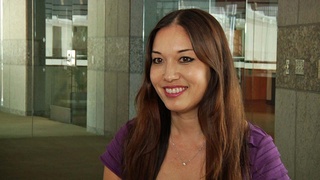Interviews
Being “Half” in Japan
In terms of my cultural identity being “half” in Japan, oObviously, you're considered a little bit exotic in the Japanese community, but you are also different. I would go to the countryside and visit with my aunties and uncles and if I walked down the street, you know, people would turn around and say, oh, “gaijin gaijin,” you know, foreigner, foreigner.
So, but within the U.S. schools, of course, I was Japanese and there were a lot of my friends I hung out with a lot of, um I would say, Japanese-Americans. Some were from Hawaii, some were from California, their parents, and also some other half girls like me. So growing up, a lot of my friends were Japanese-American or half. And it was interesting because we would speak Japanese to each other in school so nobody would understand what we were saying.
So in that sense, in the American schools, I had a really Japanese identity; in the countryside in Japan, I was considered a gaijin. And so, you know, it was a different - different differed depending on where I was.
Date: July 14, 2022
Location: California, US
Interviewer: Lana Kobayashi
Contributed by: Watase Media Arts Center, Japanese American National Museum; Japanese American Bar Association
Explore More Videos

Fitting in to both sides of her family
Jewish Japanese American journalist


Culture is an important part of one's identity
Jewish Japanese American journalist



Conflicted about immigrating to America (Japanese)
(b. 1925) War bride

Defining "Nikkei"
(1941-2018) Japanese Canadian photojournalist and activist

Unique Identity from Having Multiple Backgrounds
(b. 1938) Philipines-born hikiagesha who later migrated to the United States.

Growing up Japanese in Hawaii
(b. 1952) Former banking executive, born in Hawaii



Parents identification as Peruvian Okinawan
Okinawan American whose parents are from Peru.

Okinawan cultural appreciation
Okinawan American whose parents are from Peru.

Prejudice against Okinawans from mainland folks
Okinawan American whose parents are from Peru.

American values she aligns with
Okinawan American whose parents are from Peru.
